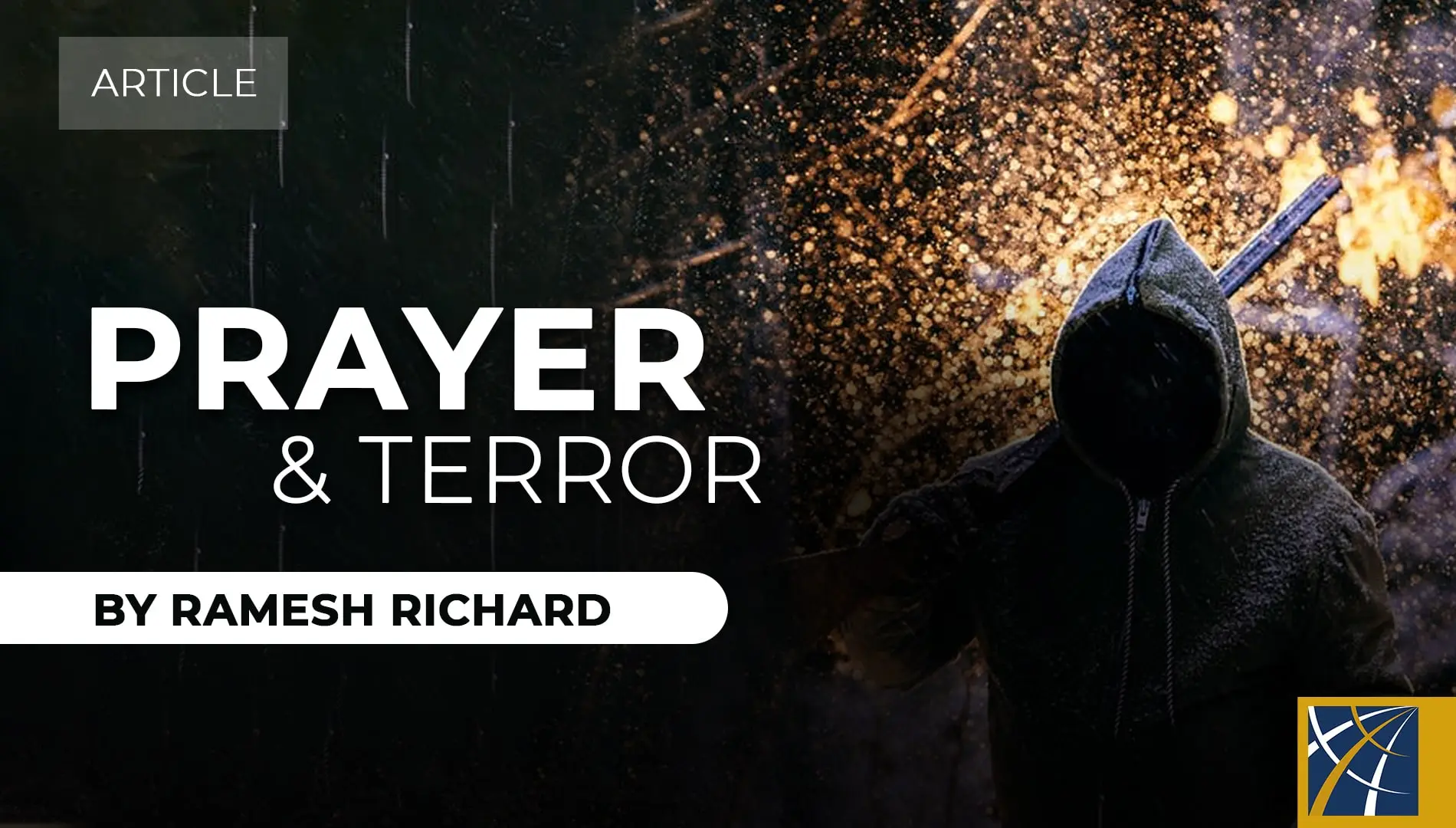Prayer & Terror
Ramesh Richard
The eyes of the entire world are focused on the newest government in South-West-Central Asia. Terrorists ravage their country, unleashing wrath against their citizens. They threaten, terrorize, and slaughter their own neighbors. Those of us helplessly watching are searching for the right words, sentiments, and prayers, especially in view of the relatively new and few members of our global family in that land and region.
World leaders must weigh potential responses to restrain murderous bestiality. Countries with regional interests react in their own ways. Nations elsewhere discuss and debate present and future implications of any counteractions.
In all of this, how should we think about this cold, cruel and callous depravity of certain members of the human race? What should the individual Christian believer do?
Imprecatory psalms (Psalms 109, 138, 140, etc.) seem an appropriate response. An imprecatory psalm calls for severe judgment on God’s enemies. When the psalmist freely invokes divine vengeance, I’m torn. My natural reaction to the cruelty of the ruthless is a very human rage accompanied by sorrow. Should I pray these imprecations on terrorists? I certainly do not have the power to inflict justice, but decisive revenge toward enemies seems instinctive. It feels right.
At the same time, the One I believe in and follow predicted a special kind of hatred and violence targeted against His own (John 15:18–25) and was Himself crucified. He preached something other than vengeance: “Love your enemies and pray for those who persecute you” (Matt. 5:44); “Bless those who curse you, pray for those who abuse you” (Luke 6:28, ESV). He practiced what He preached in His death cry: “Father, forgive them, for they don’t know what they are doing” (Luke 23:34, NET). A disciple is not greater than his teacher, neither the servant than his Lord.
Jesus forgave His persecutors—an unnatural, even supernatural response, and a potential contradiction of the psalmist’s curses against them. What do we do with this apparent Old Testament and New Testament quandary?
Here’s how I make sense of both our Lord’s prescriptions and the psalmist’s expressions.
- The Lord Jesus trumps the psalmist for which model a Christian should follow today (cf. 1 Pet. 2:19ff).
- Jesus commanded us to love, pray for and bless enemies as our personal response to persecution and martyrdom.
- Love your enemies because they are human beings made in the image of God (albeit depraved, deprived and demonized).
- Pray for (not against) enemies, that they come to know God’s eternal salvation and receive forgiveness from the Savior soon, since upcoming universal judgment will prevent their eternal salvation.
- Bless your enemies. There is a chance they could be redeemed by our Jesus-like responses to their wickedness.
- Imprecations—cursing or condemning persecutors—may be permissible in the Old Testament yet are without prescription in the New Testament. We should avoid turning the psalmist’s practice into spiritual prescriptions, just as we necessarily avoid bending the wisdom of the Proverbs into unconditional promises.
But since we certainly claim the psalmist’s other expressions for our spiritual life (e.g., Ps. 23), is there any application of imprecatory psalms to the people of God today? It is critical to overlay a New Testament lens on everything (after all, we are Christians) in order to set certain conditions for any imprecatory prayer. Even when made on behalf of others who are persecuted for righteousness’ sake (Matt. 5:10), we need to remember some important limitations.
- That we hate all evil and sin (including our own), as God does. We must reject complacency concerning some aspects of evil and use every legal means to express our abhorrence of evil and possibly restrain it.
- That in this prayer we avoid copying the religious sins of our enemies. Prayerful, anger-filled desperation toward God about those who destroy human life is acceptable. But imprecatory verbal expressions, appealing to God’s justice now or in the future, are only proper against those abusing the people of God for their faith convictions.
- That we leave it to God to punish evil, in His own way, in His time and for His reputation. Our supplications for vengeance must be requests for divine vengeance, not actions out of personal vendetta.
- That the psalmist, when he asks for the ability to cut off his enemies, is speaking as the royal representative of his covenant nation and Davidic dynasty in a way that Christian believers and churches today are not. This matter is crucial. We separate the imprecatory behavior of the psalmist as an individual from the psalmist as king, whose family line needed to continue for the still yet future Messianic heir apparent.
- That we are willing to freely suffer for the Gospel. We certainly support a military response in self-defense of all citizens (Christians and non-Christians) as a moral, governmental obligation. But I also know Christian workers today who serve in the most challenging contexts with personal convictions about spreading the Gospel, even if it means dying. Such Christians are not seeking death but are willing to suffer death for the cause of facilitating eternal life for others.
- That we don’t overlook caring for the defenseless and persecuted even as we deeply appreciate the precious public freedoms we experience. We pray for supernatural protection for all facing persecution for their faith, for supernatural strength in their hour of extreme desolation, for supernatural deliverance in accordance with God’s will, and supernatural comfort for their families.
Until Christ’s return, we willfully follow the Lord’s prescription publicly, even though we are naturally prone to the psalmist’s imprecation against enemies privately. The former might be the witness needed for one terrorist to become an evangelist.
That’s exactly what happened to Saul, who was in “hearty agreement” with the murderers while watching the execution of the first martyr (Acts 8:1). He “began ravaging the church, entering house after house, and dragging off men and women, he would put them in prison” while “still breathing threats and murder against the disciples of the Lord” (Acts 8:3; 9:1). Yet Stephen, after plainly speaking the truth (Acts 7) neither ranted nor raved against his persecutors while facing imminent death; it was the first-century terrorists who were enraged (v. 54). Instead, Stephen mimicked his Lord, requesting forgiveness for them (Acts 7:60) as he saw the Lord Jesus in heaven (v. 55) and cried out, “Lord Jesus, receive my spirit” (v. 59). Eventually terrorist Saul would become evangelist Paul. (By the way, he too died a martyr.)
I have no guarantee that any violent terrorist will embrace Jesus as the Only God who can save him or her. But might there be one Saul in the making right now among oppressors who will hear the martyrs whisper the Lord Jesus’ name?
While our natural tendency beckons divine judgment, we should pray for their salvation by the Divine Savior before wishing for their immediate or final judgment by the Divine Warrior. We dare not forget that, like Saul, terrorists too can take refuge in Jesus, God’s Son and Savior. Will God, in wrath, remember mercy for God’s people (Hab. 3:2) and for the persecutor too?
This article includes a excerpt of a 2015 article entitled “Praying Against Terrorism.” To see the full article, click here.






